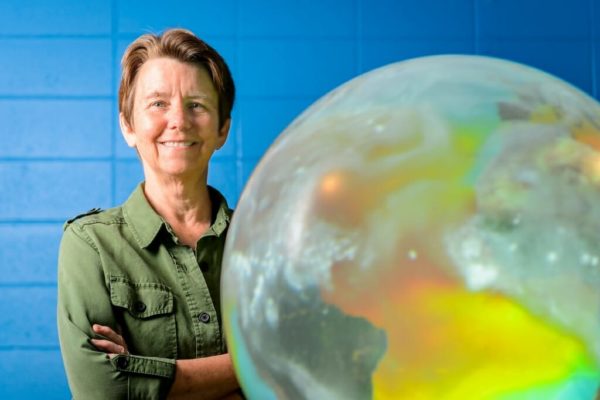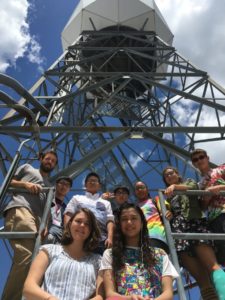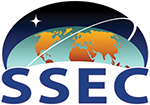Margaret Mooney recognized for public service and outreach

Margaret Mooney incorporates a 3D globe into outreach presentations to explain weather-related topics. Credit: Bryce Richter
Margaret Mooney’s modus operandi is simple. With the Wisconsin Idea as a guide, she has developed learning opportunities that have enriched people’s lives in Wisconsin and attained national prominence: a reflection of her commitment to the public service mission of the University of Wisconsin-Madison.
Mooney, who directs the Office of Education and Public Outreach at the UW-Madison’s Cooperative Institute for Meteorological Satellite Studies (CIMSS), was selected to receive the university’s 2018 Robert and Carroll Heideman Award for Excellence in Public Service and Outreach. She is one of nine academic staff selected to receive excellence awards this spring.
It is a perfect fit, says Steve Ackerman, interim director of the Space Science and Engineering Center. Ackerman, who led Mooney’s nomination, adds, “From the moment she came to CIMSS, she understood and leveraged Madison’s reputation as the birthplace of satellite meteorology to build education and outreach programs for K-12 and undergraduate students, families, and the public.”
Mooney is well-known for her ability to engage students. For example, in 2002, when she arrived at CIMSS, she took on the challenge of not only managing, but modernizing the CIMSS Summer Workshop for high school students. This one-week residence program on campus was established to teach students intent on pursuing science, technology, engineering and mathematics (STEM) careers the basics of remote sensing and weather forecasting.

High school students participate in the CIMSS Summer Workshop to learn the basics of remote sensing and weather forecasting. Here, they are shown on the roof of the AOSS building. Credit: SSEC.
Mooney brought a new and fresh vision to the program. Taking full advantage of the scientific expertise around her, she developed hands-on research and learning activities so that students could gain classroom and field experience directly from professors, graduate students, and scientists. The student workshop, entering its 27th year this summer, has been a pivotal experience in the lives of some of its participants who opted to attend UW-Madison to earn a degree in a STEM field.
Teaching students is a focus of Mooney’s work, but so is teaching their teachers. To do so, she proposed and led the development of the National Oceanic and Atmospheric Administration’s (NOAA) GOES-R Education Proving Ground because she anticipated the importance of preparing STEM teachers for the enhanced Earth imaging that would come in 2017 and beyond with our new weather satellites.
Mooney’s vision, write NOAA scientists Tim Schmit and Steve Goodman, brought together educators from schools across the US and researchers from CIMSS, so that teachers could begin to incorporate new information about monitoring hurricanes, severe storms, fires, and high impact environmental phenomena into their lesson plans.
One of the educators and workshop attendees adds:
“As a teacher, I feel it is important for our students to see the connection between weather forecasts and how we are able to get that information using satellites … We’ve had the fortune to learn about the [GOES-R] program … to build a successful lesson plan that will resonate with our students.”
But Mooney’s work extends well beyond the boundaries of local classrooms and the university. A few years ago, Ackerman and Mooney developed and taught Changing Weather and Climate in the Great Lakes Regions, a Massive Open Online Course at UW-Madison. More than 7,000 people from around the globe registered to take the class. Mooney was central to initiating a collaboration with public libraries across Wisconsin so that topics introduced in the course could be discussed at urban and rural libraries. Citizens were eager to discuss how their communities “might be changing [due to changes in weather and climate] and how they are responding to those changes.” The course garnered a wealth of publicity and was later adapted for an online undergraduate course on climate and climate change.
From her participation in campus outreach programs to her leadership roles on national committees, Mooney has been instrumental in pushing the boundaries of science outreach programming to engage and excite those who take advantage of them.
Through her dedication and hard work, says Ackerman, Mooney has achieved a national reputation of excellence and is an outstanding representative of the values of UW-Madison, teaching audiences about an “important science that impacts their lives each day: the weather, and how satellites and the UW play an important role in monitoring and understanding it.”
Mooney and the other recipients of Academic Staff Excellence Awards will be recognized for their outstanding university careers at a reception hosted by Chancellor Rebecca Blank.
By Jean Phillips
